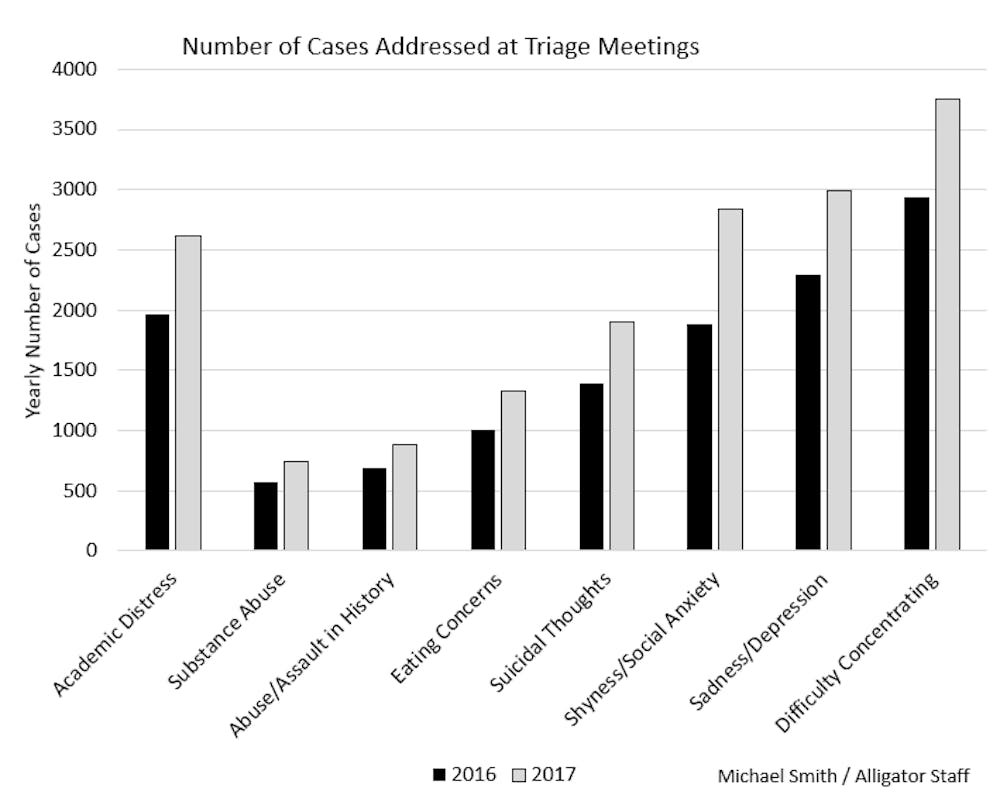To get an appointment at UF’s Counseling & Wellness Center, Laura Uribe had to sign up the first day of her freshman year.
Uribe, a 20-year-old UF political science junior, said she went to the center frequently as a freshman and this year and hasn’t had trouble scheduling appointments.
But Uribe’s case is not standard.
The past year, it took nearly two weeks for a student on the center’s wait list to get an appointment.
Ernesto Escoto, the director of the center, said the number of patients has increased with each year — but the funding the center receives and the number of counselors has remained mostly the same.
“The state legislature has indicated they don’t want to increase tuition, they don’t want to increase any fees, and as a result of that, it’s been very difficult to get additional funding over the past two, three years to increase resources in the counseling center,” Escoto said.
In late August, UF President Kent Fuchs asked for the UF Board of Trustees to approve his plan to hire 12 new mental health counselors over three years, without the recurring funds secured yet. UF will use non-recurring funding to pay for the counselors until a new source is found, according to Alligator archives.
Escoto said the Provost’s office approached the Student Affair’s office in Summer with plans to hire new counselors after the center’s request for $2.2 million was denied in May by the Florida Legislature.
Adding the counselors would reduce the center’s student-to-counselor ratio, bringing it from one counselor to nearly 1,400 students, to one counselor to nearly 1,250 students. Escoto said their goal is to have one counselor for every 1,000 students.
“The provost has committed to give us the money until we secure funding, and this is something that we have to present to the Health Fee Committee,” Escoto said.
The Health Fee allocation is decided by UF’s Local Fee Committee, made up of Assistant Vice President Kim Pace, Student Government External Affairs agency head Haley Smith, Student Body president’s Chief of Staff Nick Meno, Action SG chair Jackie Phillips, Associate Vice President Jeanna Mastrodicasa, Associate Director of UF’s Student Financial Affairs Ron Anderson, Vice President of Human Resources Jodi Gentry and Student Body Vice President Mario Agosto.
Funding from the Health Fee makes up 72 percent the center’s budget, Escoto said. Temporary funding covers 13 percent, and the state legislature covers the remaining 15 percent.
Wednesday afternoon, Escoto presented the committee with a plan to fund the new positions permanently by increasing student fees by 71.4 cents per credit hour. If approved, the additional money would raise the center’s total budget from 5.9 million to 6.4 million in the next fiscal year.
Escoto told the committee the center has been maximizing its available resources, but he expects the need for resources to only grow.
“Now that we’re officially in the top 10, I think there’s going to be an increase in the sense of stress on campus,” Escoto said.
In the 2016-2017 school year, the center saw 5,088 patients, an increase of more than 300 from the year before, which was an increase of more than 300 from the year before then, according to data Escoto presented.
Compared to 2016, the center has seen 516 more instances of suicidal thoughts, from fleeting thoughts to established plans. They’ve also seen 653 more cases of academic distress, 955 more cases of shyness and social anxiety and 701 more cases of sadness and depression. Other problems, like eating concerns and substance abuse, increased as well.
“I think college is very stressful for anyone,” Uribe said. “We’re not taught about understanding ourselves and understanding where our limits are, our boundaries are.”
Uribe said if the state legislature won’t give the center more funding, UF should reconfigure its budget to assist the center. Last year at an event the center held, Uribe told employees she wished they got more funding. They told her if more students advocated, it could create a push for change.
“I’m very displeased with how Student Government allocates the money and allocates their resources,” she said.
Student Body President Smith Meyers said SG is committed to getting more resources for mental health and making the temporary funding permanent, whether it’s through speaking to university administrators to find places in the budget or lobbying in Tallahassee.
Meyers said he can’t speak for the decision of the Local Fee Committee since he isn’t a member, but he’s sure they will handle it well.
“I have confidence that those members will make the appropriate decision,” he said. “It’s not the easiest decision for any kind of fee increase because you’re raising the cost of education for students.”
Uribe said it’s upsetting that not every student can get the resources they need immediately. Friends of Uribe have had to be put on the wait list.
“It’s kind of like a funnel,” Uribe said. “So many people try to go in, but they can only take in a trickle at a time.”






